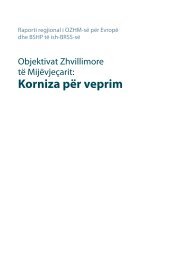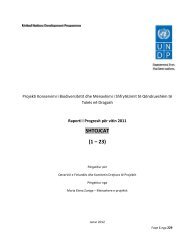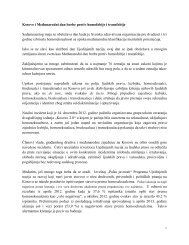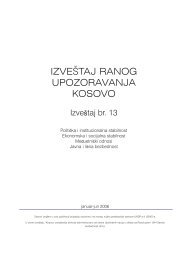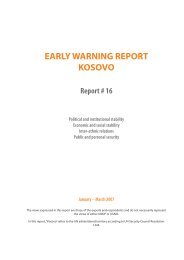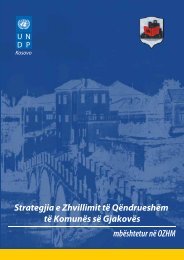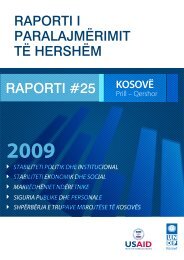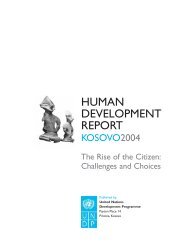Kosovo Human Development Report 2010 - UNDP Kosovo - United ...
Kosovo Human Development Report 2010 - UNDP Kosovo - United ...
Kosovo Human Development Report 2010 - UNDP Kosovo - United ...
You also want an ePaper? Increase the reach of your titles
YUMPU automatically turns print PDFs into web optimized ePapers that Google loves.
Kosova Education Centre (KEC) was<br />
involved in training over 15000 local<br />
teachers between 2000 and 2008 in<br />
various innovative, interactive and<br />
inclusive teaching methodologies,<br />
techniques and approaches with<br />
Reading and Writing for Critical Thinking<br />
(RWCT), Step by Step, Social Justice,<br />
and Education for Children’s Rights<br />
taking central role both by quantity<br />
(programmes last between 5 and 15<br />
training days) and quality (usually the<br />
interest for these courses exceeds the<br />
offer). During this period, over 130 local<br />
trainers have been trained in inclusive<br />
and related approaches.<br />
Mapping Policies and Practices<br />
for the Preparation of Teachers<br />
for Inclusive Education in<br />
Contexts of Social and Cultural<br />
Diversity Country <strong>Report</strong> for<br />
<strong>Kosovo</strong>, 2009<br />
oped by MEST in consultation with<br />
key stakeholders, including representatives<br />
of socially excluded<br />
groups themselves. Since implementation<br />
is a difficult and often<br />
secondary process in <strong>Kosovo</strong>, the<br />
international community should<br />
reframe its efforts towards ensuring<br />
that existing legislation for<br />
inclusive education can be operationalized<br />
in the real world.<br />
• Tailor budget allocations towards<br />
strategies to promote the included:<br />
inclusion-sensitive budgeting is<br />
fundamental to the process of social<br />
inclusion in education. Strategies<br />
to encourage inclusion require<br />
special and sustainable allocations,<br />
delivered on time from central authorities<br />
and executed by municipal<br />
authorities. For example, the MEST<br />
could consider allocating more<br />
funds for transportation to address<br />
the needs of rural communities.<br />
When secondary school education<br />
becomes obligatory it will be very<br />
difficult for rural students to fulfil this<br />
requirement as travel to the nearest<br />
city is time-consuming and costly.<br />
115 If these and other options to<br />
promote inclusion are given a reliable<br />
funding source, <strong>Kosovo</strong> could<br />
make visible inroads to overcome<br />
barriers to inclusion - particularly<br />
logistical barriers for children ready<br />
to attend - in a relatively short<br />
space of time.<br />
• Strengthen the evidence base for<br />
social inclusion, including through<br />
the next census: the weak evidence<br />
base for education policies<br />
in general, and particularly for the<br />
impact of exclusion on education,<br />
undermines the strength of future<br />
policy options. A number of opportunities<br />
to strengthen the evidence<br />
base may be forthcoming,<br />
including the planned census. In<br />
addition, ministries responsible<br />
for the implementation of programmes<br />
supporting social inclusion<br />
may develop and implement<br />
targeted surveys to obtain disaggregated<br />
data on specific socially<br />
excluded groups. For example, for<br />
persons and children with disabilities<br />
a survey could be conducted<br />
to estimate the number of those<br />
whose needs are met, not met or<br />
partially met, broken down by demographic<br />
profile, level of income,<br />
education level, level of disability<br />
and ethnicity. There is also a need<br />
to conduct research to identify<br />
gaps in services provided to some<br />
marginalized groups that may not<br />
be addressed through nationwide<br />
sector-specific tools. At the same<br />
time, systematic training should<br />
be provided for public servants to<br />
better the use of available data in<br />
policy development, budgeting,<br />
implementation and monitoring.<br />
ACCESS TO EDUCATION AND EXCLUSION<br />
| 63



